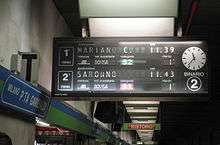Milan suburban railway service
 | |||
|
A TSR train at Milano Porta Venezia railway station | |||
| Overview | |||
|---|---|---|---|
| Locale | Milan, Lombardy | ||
| Transit type | Commuter rail | ||
| Number of lines | 11 | ||
| Number of stations | 125 | ||
| Daily ridership | 165,000[1] | ||
| Operation | |||
| Began operation | 2004 | ||
| Operator(s) | Trenord | ||
| Host railroads | Rete Ferroviaria Italiana, Ferrovienord | ||
| Number of vehicles | E.464, TAF, TSR | ||
| Headway | up to 6 minutes in the central track | ||
| Technical | |||
| System length | 359 km (223 mi) | ||
| Track gauge | 1,435 mm (4 ft 8 1⁄2 in) standard gauge | ||
| Electrification | 3 kV DC, overhead line | ||
| |||
The Milan suburban railway service is a commuter rail system serving the metropolitan area of Milan, Italy. The system comprises 11 lines serving 125 stations, for a total length of 359 km. There are 415 trains per day with a daily ridership of about 165,000.[1]
The core of the system is the Passante, an underground railway running through the city approximately from the north-west to the south-east. Several lines share this track, making the service in the city centre comparable to a metro line.[2]
The service timetable is based on a clock-face scheduling. Although operated by different companies, the Metro and the suburban rail service have integrated tickets.
Network
Lines in darker background run through the Milan Passante railway.[1]
| Line | Terminals[1] | Length[3] | Stations[4] | Operator[3] | |
|---|---|---|---|---|---|
| km | mi | ||||
| Saronno – Lodi | 55.4 | 34.4 | 25 | Trenord | |
| Mariano Comense – Milano Rogoredo | 34.0 | 21.1 | 20 | Trenord | |
| Saronno – Milano Cadorna | 23.6 | 14.7 | 13 | Trenord | |
| Camnago-Lentate – Milano Cadorna | 21.2 | 13.2 | 13 | Trenord | |
| Varese – Treviglio | 92.6 | 57.5 | 31 | ATI Trenord-ATM[5] | |
| Novara – Pioltello ( – Treviglio) | 83.5 | 51.9 | 25 | Trenord | |
| | Lecco – Milano Porta Garibaldi | 57 | 35 | 22 | Trenord |
| Lecco – Milano Porta Garibaldi | 49.9 | 31.0 | 13 | Trenord | |
| Saronno – Albairate Vermezzo | 64.0 | 39.8 | 23 | Trenord | |
| Chiasso – Rho | 51.4 | 31.9 | 18 | Trenord | |
| Milano Bovisa – Pavia | 32.0 | 19.9 | 13 | Trenord | |
Lines which share same tracks for the majority of the route are generally identified by similar colors.
Lines
Trains run every 30 minutes in each line, generally from 6 am to 9 pm or midnight depending on the line.[1]
Integrated ticketing
An integrated ticket is used inside the Milan urban area for bus, tram and metro lines, as well as the suburban railway. The urban single journey ticket costs €1.50.[6] Other tickets are available, including 24h and 48h tickets and night ticket.[6] Regional train fares apply outside the urban limit.
Between 2004 and 2007 ATM introduced Itinero smartcard, a proximity card which can be charged with season tickets, replacing paper for this type of tickets in the Milan area. At the beginning of 2010, a new smartcard, RicaricaMi, was introduced. The new card can be charged up with credit and can be used for travel in place of magnetic paper tickets, on the model of London's Oyster card.[7] These cards are also valid on the suburban railway lines.
Rolling stock
Several train classes are operated on the network.[8] TAF (Treno Alta Frequentazione) class trains were introduced since the end of the 1990s. Trenord is now introducing new Treno Servizio Regionale (TSR) class trains to replace older rolling stock. On the S9, S11 and S8 are the Vivalto train and the double decker train
History
Full service started on 12 December 2004 with the completion of the Passante and the activation of the first 8 lines. However, a shuttle service was running since 1997 in the partially completed track.[9]
Line S4 was extended from Seveso to Camnago on 19 February 2006. The new Romolo station on line S9 was opened 3 months later. Lines S1, S2, S6 and S10 were extended from Porta Vittoria to the new station of Rogoredo on 15 June 2008.
Two new stations, Pregnana Milanese and Rho Fiera Milano were opened in 2009. Line S8 and S11 began operation at the end of the same year, while the service was extended to reach Lodi and Treviglio.
On 26 March 2011, with the completion of the Milan Metro Line 3 north extension, a new station, Affori, was opened in place of the old one, to be an interchange with the Metro.
On 1 May 2011 a new company, Trenord, was created from the joining of the two main regional train operators in Lombardy, Trenitalia and LeNord.[9] Trenord is since then the operator of most of suburban lines.
Planned extensions
- line S2: extension from Milano Rogoredo to Pieve Emanuele.
- line S8: extension from Milano Porta Garibaldi to Rho.
- line S13: extension from Milano Bovisa to Saronno.
At least two new lines are expected to enter service in the next years:
- line S12: Varedo - Melegnano.
- line S15: Magenta - Milano Rogoredo.
Several new stations are also planned for the Milan urban area: Milano Tibaldi, the renewed Milano Porta Romana and others.
See also
- Transport in Milan
- Milan Metro
- Milan Passante railway
- List of Milan suburban railway stations
- Canton Ticino rapid transit
Gallery
-
Milano Porta Garibaldi railway station, mezzanine level
-
.svg.png)
Map of the system
-

Geographic map of the system
Notes and references
- 1 2 3 4 5 "Le linee S [Suburbane]". Trenord. Retrieved 4 June 2015.
- ↑ "Infrastrutture e Mobilità :: S come Suburbano". Trasporti.regione.lombardia.it. Retrieved 2012-02-10.
- 1 2 Filippo. "UrbanFile - Milano | Servizio ferroviario suburbano (Linee S)". Urbanfile.it. Retrieved 2012-02-10.
- ↑ "msrmilano". msrmilano. Retrieved 2012-02-10.
- ↑ "Linea S5 - Chi siamo" [Who we are] (in Italian). www.lineas5.it. Retrieved 18 February 2012.
- 1 2 "Biglietti urbani". www.atm-mi.it. Retrieved 2 October 2011.
- ↑ "ANCHE MILANO HA LA SUA OYSTER CARD: ITINERO RICARICAMI". Partodamilano. Retrieved 2 October 2011.
- ↑ "La flotta". Trenord. Retrieved 16 February 2012.
- 1 2 "Una storia da sempre in movimento - GRUPPO FNM". Fnmgroup.it. Retrieved 2012-02-10.
External links
| Wikimedia Commons has media related to Milan suburban railway service. |
- Trenord - Le linee S (Italian)
- Map PDF
- Line S5 (Italian)
| ||||||||||||||||||||||||||||||||||||

